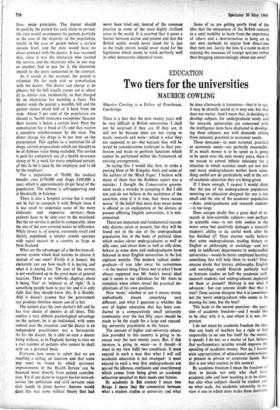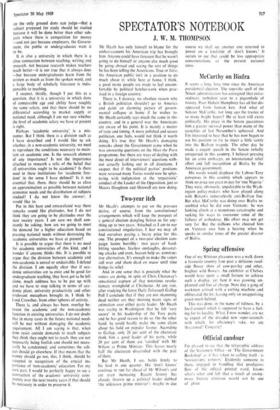Two tiers for the universities
EDUCATION MAURICE COWLING
Maurice Cowling is a Fellow of Peterhouse, Cambridge.
There is a fear that the next twenty years will be very difficult in British universities. I shall not be surprised if they are. If they are, it will not be because dons are not trying to teach, research and write—which is what they are supposed to do—but because they will be tested by considerations irrelevant to their pro- fession and made to perform functions which cannot be performed within the framework of existing arrangements.
In saying this, I would like, first, to strike a passing blow at Mr Kingsley Anus and some of the authors of the 'Black Paper.' I believe with many of them that the Robbins report was a mistake: I thought the Conservative govern- ment made a mistake in accepting it. But I did not and do not believe in the usefulness of the assertion, even if it is true, that 'more means worse.' If the belief that more does mean worse is offered as an explanation of the distress at present afflicting English universities, it is mis- conceived.
There are important and fundamental reasons why distress exists at present, but they will be found not in the size of the undergraduate population but in the body of political ideas which makes clever undergraduates as well as silly ones, and clever dons as well as silly dons, behave as some dons and undergraduates have behaved in most English universities in the last eighteen months. The modern radical under- graduate—if you take away his earnestness —is the nearest thing I have met to what I have always supposed was Mr Amis's moral ideal and it seems to me ridiculous for Mr Amis to complain when others reveal the practical im- plications of his own positions.
Now 'more,' whether or not it means worse, undoubtedly means something very different, and what I question is whether the sort of higher education that has been con- ducted in a comparatively small university community over the last fifty years should be made to be the staple for a large and expand- ing university population in the future.
The amount of higher and university educa- tion provided in this country is going to in- crease over the next twenty years. But, if this increase is going to occur—as it should—it must in my view fulfil two conditions. It must expand in such a way that what I will call academic education is not swamped: it must expand in such a way that undergraduates ate spared the idleness, confusion and unsettlement which comes from being given an academic education unsuited to their needs and futures.
By academic in this context I mean two things. I mean that the connection between what a student studies at university and what he does afterwards is fortuitous—that is to say, it may be directly useful or it may not, but that does not matter. And I mean that, in deciding to
develop subjects for undergraduate study and for research, universities are concerned with the intelligence dons have displayed in develop- ing these subjects, not with demands arising from national, practical or economic needs.
These demands—to meet national, practical or economic needs—are perfectly reasonable.
If as much money is to be spent as is going to be spent over the next twenty years, there is no reason to extend infinite tolerance for a
situation in which national needs are not met and many undergraduates neither learn some- thing useful nor do particularly well at the sort of academic education they are being given.
If I knew enough, I suspect I would think that the size of the undergraduate population
receiving an education designed for use is too small and the size of the academic population —dons, undergraduates and research students —is too large.
Does anyve doubt that a great deal of re- search in non-scientific subjects—and perhaps in scientific ones—is not only useless in the worst sense but positively damages a research student's ability to do useful work after he has finished it? Does anyone really believe
that some undergraduates reading history or English or philosophy or sociology—and not
only in indifferent departments in understaffed universities—would be better employed learning something that will help them to work? Does anyone doubt that history, philosophy, English
and sociology could flourish perfectly well as humane studies on half the academic staff,
research students and undergraduates deployed on them at present? Halving is not what I advocate: but can anyone doubt that that is true? Does anyone disagree that it is sometimes not the worst undergraduate who seems to be wasting his time, but the best?
This leads to the second question—the ques- tion of academic freedom—and I would like to be clear why it is, and where it is not, im- portant.
I do not mean by academic freedom the idea that any body of teachers has a right to feel responsible to no one but itself for the money it spends. I do not, as a matter of fact, believe that parliamentary scrutiny would improve the spending of academic money. Nor do I favour state appropriation of educational endowment, at present in private or corporate hands. But that is not what matters in this context.
By academic freedom I mean the freedom of dons to decide not only who shall ha‘e academic jobs and how teaching is to be done. but also what subjects should be studied and on what scale. An academic university in my view is one in which dons make these decisions
t the only ground dons can judge—that a subject proposed for study should be studied because it will be done better than other sub- jects where there is competition for money —and not just because employers, the Govern- ment, the public or undergraduates want it to be.
It is also a university in which there is a close connection between teaching. writing and research, not because research makes teachers teach better—it is not true that it always does —but because undergraduates learn from the written as much as from the spoken word, and a large body of scholarly literature is indis- pensable to teaching.
I suspect, thirdly, though I put this as a question. that it is a university in which dons of comparable age and ability have roughly the same salary, and that there should be no differential according to market supply or national need, although I am not sure whether the level of academic salary we have at present is right.
Perhaps 'academic, university'. is a mis- nomer. But I think there is a division such as I have described and I would like to ask whether, in a non-academic University, we need to reproduce the conditions necessary to main- tain an academic one. Is the research element. of any importance? Is not the importance attached to research a relic of the belief that all universities ought to be academic? IS there need in these institutions for 'academic free- dom' in the sense I have defined? Is it not essential that, there, there should be as close an approximation as possible between national economic needs and the distribution of subjects studied? I do not know the answer: I would like to.
Put in this bare and emasculated way these remarks sound like platitudes, but I do not think they are going to be platitudes over the next twenty years. I am sure -we shall con- stantly be asking; how are we going to meet- the demand for a higher education based on pressing national needs without destroying the academic universities we have at present?
It is possible to argue that there is no need for academic universities of this kind, and I wonder if anyone thinks this. It is possible to argue that the division between academic and. non-academic is unreal or undesirable. I defend the division. I am equally clear that if aca- demic universities are to exist and be good for undergraduate teaching, they have got to be left alone, much oddness has to be put up with and we have to stop talking in terms of aca- demic plant, university productivity and other irrelevant metaphors brought in, I think by Lord Crowther, from other spheres of activity.
There is, and always has been, overlap be- tween the academic and the non-academic function in existing universities. I do not doubt that in many cases in the future national needs will be met without damaging the academic requirement. All I am saying is that, when dons resist outside demands to teach subjects they think they ought not to teach, they are not necessarily being foolish and should not neces- sarily be condemned, and sometimes the sub- ject should go elsewhere. If that means that the money should go too, this, I think, should be accepted in recognition of the crucial im, portance of 'non-academic' education. For my own part, I would be perfectly happy to see a contraction of the academic university com- munity over the next twenty years if that should be necessary in order to preserve it.



































 Previous page
Previous page